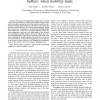Free Online Productivity Tools
i2Speak
i2Symbol
i2OCR
iTex2Img
iWeb2Print
iWeb2Shot
i2Type
iPdf2Split
iPdf2Merge
i2Bopomofo
i2Arabic
i2Style
i2Image
i2PDF
iLatex2Rtf
Sci2ools
TON
2016
2016
Content-Centric Wireless Networks With Limited Buffers: When Mobility Hurts
—We analyze throughput-delay scaling laws of mobile ad-hoc networks under a content-centric traffic scenario, where users are mainly interested in retrieving contents cached by other nodes. We assume limited buffer size available at each node and Zipf-like content popularity. We consider nodes uniformly visiting the network area according to a random-walk mobility model, whose flight size varies from the typical distance among the nodes (quasi-static case) up to the edge length of the network area (reshuffling mobility model). Our main findings are i) the best throughput-delay trade-offs are achieved in the quasi-static case: increasing the mobility degree of nodes leads to worse and worse performance; ii) the best throughput-delay trade-offs can be recovered by power control (i.e., by adapting the transmission range to the content) even in the complete reshuffling case.
TON 2016 |
| Added | 11 Apr 2016 |
| Updated | 11 Apr 2016 |
| Type | Journal |
| Year | 2016 |
| Where | TON |
| Authors | Giusi Alfano, Michele Garetto, Emilio Leonardi |
Comments (0)

